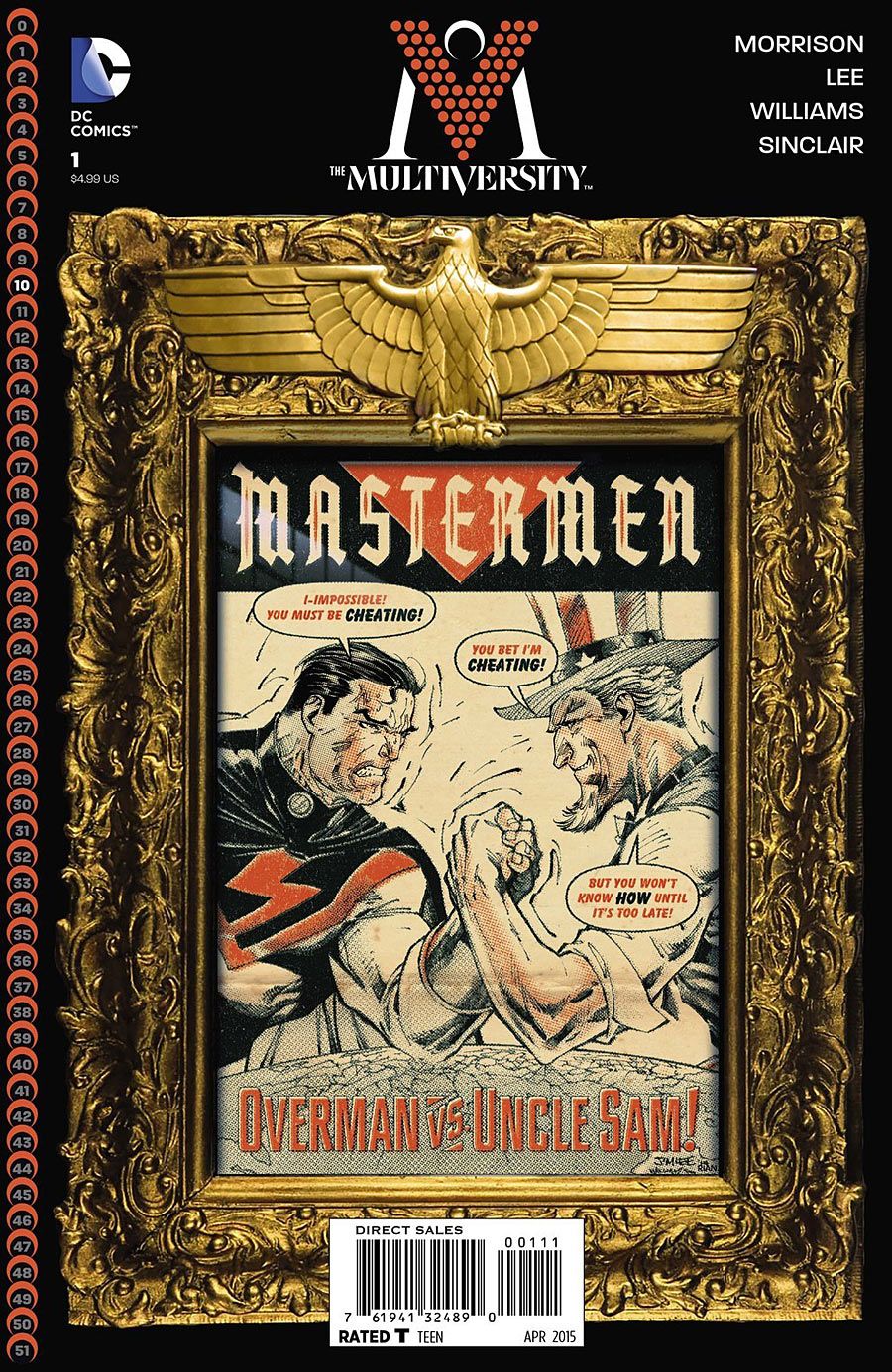The latest chapter of Grant Morrison's epic "Multiversity" event continues in "The Multiversity: Mastermen" #1, illustrated by Jim Lee and a team of inkers and colorists. This time, the intense and cataclysmic events take place on the world designated as Earth 10, aka Earth X, where Nazi Germany has achieved world domination thanks to the unexpected arrival of a certain Kryptonian rocket ship within their borders. Of course, this is also a world that has long been home to freedom fighter Uncle Sam and, while he doesn't engage a Nazi version of Superman in an arm-wrestling contest like Lee and Rian Hughes' throwback cover indicates, there is a far more destructive encounter within and the lead-up to this showdown makes this issue another excellent entry in Morrison's "Multiversity" tapestry.
Lee and Hughes' cover, despite its literal imagery, nonetheless provides a simple yet bold and symbolic foreshadowing of the events inside. The ornate, golden frame with its prominent Nazi eagle symbol encasing the fictional World War II-era "Mastermen" comic suggests the idea of Nazi dominance, and Uncle Sam's caption teases of a trick that he indeed does have up his sleeve. The issue's cover does not forewarn readers of the kind of shocking sight they'll see when they first open up the issue, though. As rendered by Lee, the splash page is both horrific yet almost impossible not to laugh at, and the following pages flush out a few more laughs, even while running the risk of pushing things a little too far.
Things take on a far more serious tone shortly thereafter, as Morrison upends baby Kal-El's defining moments in this alternate world, establishing an effectively sinister instance where Adolf Hitler himself perverts the very meaning of the name Superman as well as another one of the Man of Steel's many nicknames. It's the first of many disturbing moments as the story then shifts from early WWII to America's final days in the 1950s with a beautifully ominous double-page spread of a threatening and dictatorial-looking "Overman" lording over a Nazi invasion. Lee's spread is worthy of reader scrutiny, with its details capturing the utter destruction of a nation while evoking the feel of a propaganda poster.
Lee goes on to painfully convey the perversion of an American icon, paying homage both to his own past work as well as that of others with images of Overman playing a large part in the dismantling of the nation he's so strongly associated with elsewhere in the multiverse. Colorists Alex Sinclair and Jeromy Cox do their part in this effort by muting the bright, vibrant colors associated with the Man of Steel. The art team fills the entire issue with unsettling images of a defeated America, or Germanica as Morrison now calls it.
Morrison, though, takes an unexpected but welcome turn with Overman's characterization, establishing that his morals are not entirely a function of his upbringing and that, despite the fascist regime that he fights for, he has an inner moral compass pointing in the right direction. Overman harbors regret for both the past actions of Nazi Germany as well as his own, a perceived weakness that puts him in conflict with both his allies and his consort. Redheaded Lena might look familiar, but she's not a wholesome farm girl on this earth, and Overman's superhero allies have no apparent noble motives whatsoever.
As dire as circumstances seem, though, Uncle Sam and his team have the means to stand up to this seemingly undefeatable regime, as Morrison references developments from past "Multiversity" one-shots. There's less mention of a crisscrossing multiverse here, and no overt mention of the comic book connection established in past issues, which works out just fine for this story. Instead, Morrison focuses on the repercussions of an alien spacecraft landing in Germany instead of Kansas and the catastrophic fight to reclaim a nation. As such, it's a very tense and emotionally jarring story, made more so by the powerful narration from Overman's supposed pal.
Those put off by the far-reaching and dimension-hopping occurrences of previous installments will find "The Multiversity: Mastermen" #1 a far more localized and accessible comic that can be enjoyed just fine as a standalone, independent of the rest of the series. This is a superbly paced and constructed issue, balancing darkness with humor, despair with hope and human drama with high-stakes conflict. Anyone who thought they hated "Multiversity" will want to have a look at this one.

